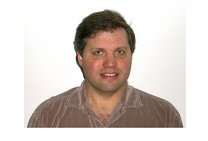Oral history interview with Timothy L. Manser
- 1990-Oct-18
Timothy L. Manser grew up in Phoenix, Arizona, one of two children. His father was a lawyer and his mother mostly a housewife. He liked school; though he says the schools were not very good, he did have a good biology teacher in high school. His family vacationed in San Diego, California, where he developed an interest in oceanography.
Manser majored in biology at University of California, San Diego, chosen for its good programs as well as its proximity to the beach and surfing. He worked on Dictyostelium in William Loomis’ lab. For graduate school he chose University of Utah. He went through a number of rotations, finally settling in Raymond Gesteland’s lab. Influenced by Martin Rechsteiner, Manser began work in small nuclear RNAs focusing on the genes that encoded these RNAs in humans. When he had had enough of DNA cloning and sequencing of genes he decided to switch fields to immunology. Relying on Gesteland’s recommendation, he took a postdoc at Massachusetts Institute of Technology (MIT) with Malcolm Gefter who had been trained as a Biochemist. Manser’s first job was at Princeton University, where he has continued his work, begun in Malcolm Gefter’s lab at MIT, on B cells.
Manser laments the current state of funding for science: too little, too devoted to applied science, too competitive, too political. He says the need for short-term productivity (i.e. publications) promotes inaccuracy, oversimplification, and even falsification. He found that the Pew Scholars Program in the Biomedical Sciences award often has to be used for lab maintenance rather than for innovation or daring science, unless the recipient already has large funding. He thinks occasionally about changing fields to neurobiology; he is also considering going into administration as a way to encourage young scientists. He discusses balancing home life with life in the lab and his wife’s career sacrifices.
Access this interview
By request 1 PDF Transcript File and 4 Audio Recording Files
Fill out a brief form and a staff member will review your request for these files. You should receive an email within 3 business days.
Usage is subject to restrictions set by the interviewee.
If you have any questions about transcripts, recordings, or usage permissions, contact the Center for Oral History at oralhistory@sciencehistory.org.





